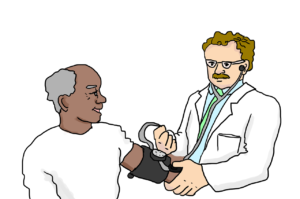
Regular check-ups and screenings play a crucial role in maintaining optimal health and preventing potential health problems. Many individuals only visit healthcare providers when they feel unwell, overlooking the importance of preventive care. However, preventive healthcare is key to early detection, timely intervention, and overall well-being. In this article, we will explore the significance of regular check-ups and screenings, emphasizing their role in preventing illness and promoting long-term health.
1. Early Detection of Health Conditions:
Regular check-ups and screenings facilitate early detection of health conditions. Many diseases, such as cancer, diabetes, cardiovascular disorders, and hypertension, may not exhibit noticeable symptoms in their early stages. Through regular screenings, healthcare professionals can identify subtle warning signs or risk factors, enabling timely intervention and treatment. Early detection significantly improves the chances of successful treatment and better health outcomes.
2. Prevention and Risk Reduction:
Preventive screenings provide an opportunity to assess your risk factors for various diseases. By identifying risk factors such as high blood pressure, high cholesterol, or abnormal blood sugar levels, healthcare professionals can offer guidance on lifestyle modifications, recommend preventive measures, and develop personalized prevention plans. Addressing risk factors early on can significantly reduce the likelihood of developing chronic conditions.
3. Health Monitoring and Disease Management:
Regular check-ups allow healthcare providers to monitor your overall health and track any changes over time. By assessing vital signs, reviewing medical history, and conducting physical examinations, they can identify trends, address concerns promptly, and adjust treatment plans if necessary. This proactive approach helps in managing chronic conditions, ensuring appropriate medication management, and providing necessary support and guidance.
4. Immunizations and Vaccinations:
Regular check-ups provide an opportunity to stay up-to-date with immunizations and vaccinations. Vaccines protect against various infectious diseases, reducing the risk of illness and its associated complications. Healthcare providers can assess your immunization status, recommend appropriate vaccines based on your age, lifestyle, and health conditions, and ensure you are adequately protected.
5. Health Promotion and Education:
Regular check-ups offer an opportunity for healthcare professionals to provide health promotion and education. They can offer guidance on healthy lifestyle choices, discuss preventive measures, and provide personalized recommendations based on your unique health needs. This includes discussions on nutrition, physical activity, mental well-being, stress management, and other aspects that contribute to overall health and well-being.
6. Peace of Mind and Reduced Anxiety:
Regular check-ups and screenings provide reassurance and peace of mind. Knowing that you are actively participating in your health care and receiving professional guidance can alleviate anxiety and foster a sense of control over your well-being. It empowers you to make informed decisions, take proactive measures, and prioritize your health.
7. Long-Term Cost Savings:
Preventive care and early detection can lead to significant long-term cost savings. Detecting and addressing health issues at an early stage is often less costly than treating advanced or chronic conditions. By investing in regular check-ups and screenings, you not only safeguard your health but also minimize the financial burden associated with prolonged or intensive treatments.
Conclusion:
Regular check-ups and screenings are essential components of preventive healthcare. They enable early detection, provide opportunities for risk reduction, support disease management, promote health education, and offer peace of mind. By actively engaging in preventive care, you prioritize your well-being, maximize the chances of early intervention, and establish a foundation for long-term health. Remember, your health is your most valuable asset, and regular check-ups and screenings are powerful tools in safeguarding it.
